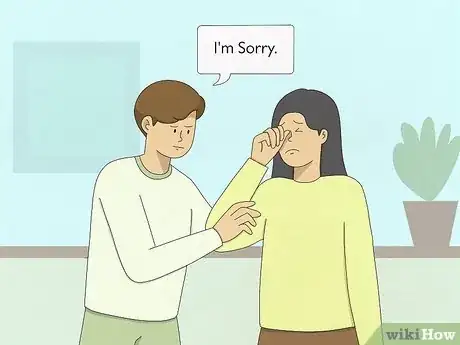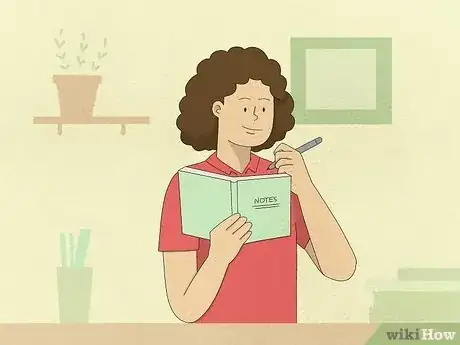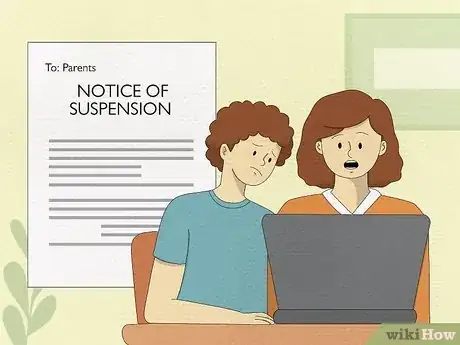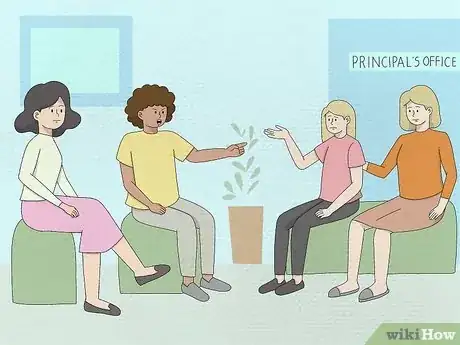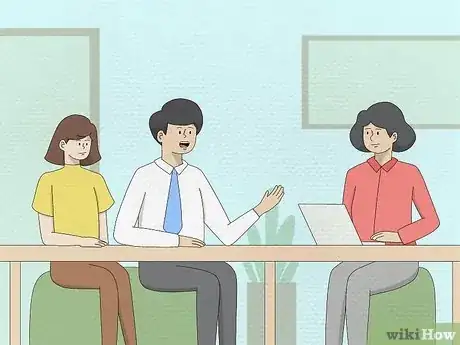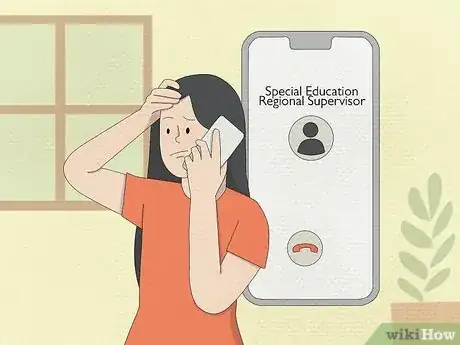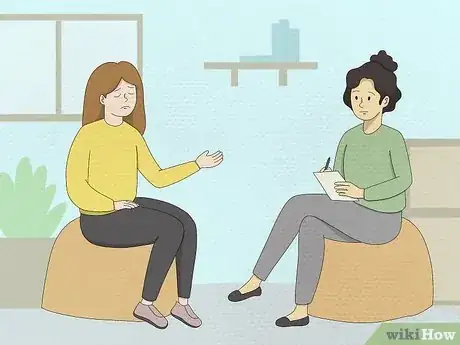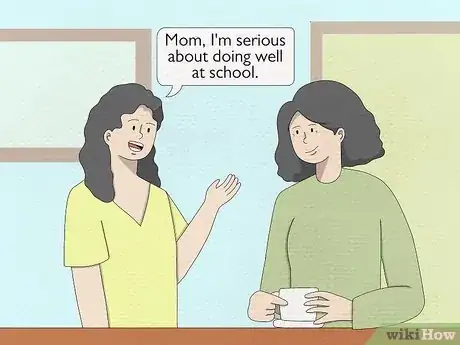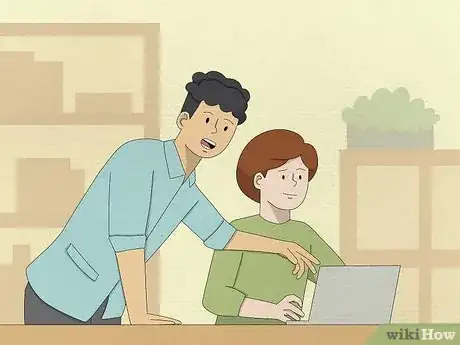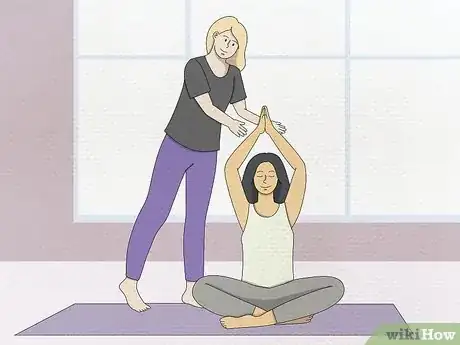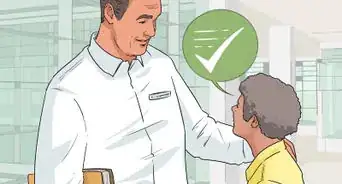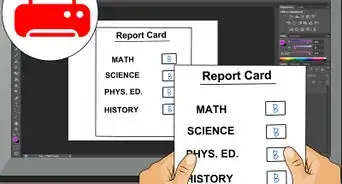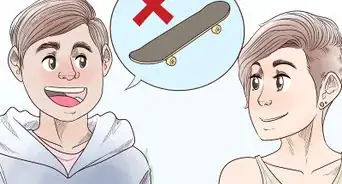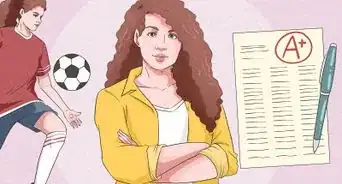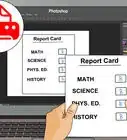This article was co-authored by Evanne Torrecillas. Evanne Torrecillas is a School Counselor with over four years of experience in education. She specializes in working as a mental health advocate with middle school students and their caretakers. Evanne holds a BA in Political Science from The University of California, Berkeley and an MS in Counseling with a specialization in School Counseling from California State University, Sacramento.
This article has been viewed 34,884 times.
The work you do in school is an investment in your future, and getting in trouble can get in the way of your plans. It's unusual to get all the way through school without getting in trouble at some point. Once you get in trouble, it seems hard to stay out. Some discipline is unfair, and some students get singled out for punishment more than others who may have been equally out of line. Keeping your cool and communicating with authority figures will help you minimize your punishment. Learning your rights can help you prevent suspension or expulsion. Taking care of yourself and addressing any problems you have been facing will help you cope with the hard time and prevent future run-ins with the principal.
Steps
Dealing with Punishment
-
1Tell the truth. If you have been accused of doing something you did, admit it. Even if you think the story has been twisted, acknowledge the parts that are true. If you appear cooperative, you will have an easier time telling your side of the story. There is always something you could have handled better. If you were being bullied and got angry, you might be in trouble for losing your temper. First admit that you need to work on regulating your temper, then explain about the bullying.
- If you have been accused of something you didn't do, stay calm. It is frightening when an authority figure has the wrong idea about something, but if you panic you will have a harder time explaining the mistake.
- Ask for a teacher you trust, as well as a parent or guardian, to be present when you are being disciplined.
-
2Apologize to anyone affected. Even if you disagree with how your discipline is being handled, apologize for anything you could have done better. Admitting that you feel regret is a sign of maturity. You may even be punished less if you show that you understand what you did, are sorry for it, and plan on never doing it again. You might apologize to your teachers, school administrators, and fellow students.
- Apologize to your parent or guardian as well. They may have to lose a day of work or deal with other unpleasantness as a result of you being in trouble at school.
Advertisement -
3Make the most of your punishment. You may find yourself depressed and discouraged after getting in trouble at school. It can be easy to get further behind on schoolwork during this time, especially if you are suspended. You may also find yourself grounded as a result of being in trouble at school, which will leave you with extra time on your hands. Try to use this time to catch up on your schoolwork, and work ahead if possible.
- Review your notes from the semester, and study for upcoming tests if you can.
- Get ahead on your reading. Start whatever book you have coming up in English class, or read the next few chapters in your textbook.
- If you have any big projects coming up outside of school, such as college applications, take this time to do some research.
- You are less likely to be punished again if you are perceived as being responsible and organized.
Contesting an Unfair Suspension or Expulsion
-
1Learn your rights. For a more serious punishment, such as a suspension or expulsion, your school needs to follow certain rules. Look up your district's Code of Conduct, or Discipline Code, online, and call into a district office to get a longer explanation of disciplinary procedures. If you think you are being suspended unfairly or that rules are not being followed, you have the legal right to contest your suspension.[1]
- Most schools distribute some kind of student handbook at the beginning of the year that includes Student Conduct rules, and post the rules around the school. If your school has not published or distributed school rules, you may be able to argue that you didn't know you were breaking a rule.
- Even if you have already gone through your suspension, it's worth proving that you were suspended unfairly, as it can get the suspension removed from your record.
-
2Determine that you were properly notified. You probably have the Right to Notice. This means that your school must provide notice of your suspension to your parents or guardians within 24 hours of its beginning. The notice must include a date and description of the event with enough detail for you to recognize it. If this information is not included, you may be able to return to school or have the suspension removed from your record.[2]
-
3Confer with the principal. You probably have the right to a conference with the principal. This conference will include you, a parent or guardian, your principal, and the person who accused you of misbehavior. If the person who accused you was another student, they might not be there. Otherwise, you are permitted to ask your accuser questions before the principal.[3]
-
4Demand your education. Check to see if you have the right to alternative instruction. Depending on the school district, and your age, you may have the right to continue your schoolwork during suspension. This may happen at home, on your school campus, or in a detention center.[4]
-
5Get a fair hearing. Depending on your school district and the length of your suspension, you may have the right to a hearing in front of an employee of the school district. You may be represented by your parent or guardian, another trusted adult, or a lawyer. Contact local law schools and other organizations in your area and ask if they offer free representation.[5]
-
6Speak up against discrimination. If you have an Individualized Education Plan (IEP), you have additional rights. Students with disabilities should contact the Special Education Regional Supervisor for their district. You are likely eligible for testing for behavioral problems.
- If you believe you are being discriminated against due to race, sex, or disability, file a complaint with the Office for Civil Rights of the U.S. Department of Education within 180 days of getting in trouble.[6]
Getting Back on the Right Track
-
1Get to the root of the problem. Ask yourself what caused you to do the thing that got you in trouble, and what you can do to prevent it happening again. How have you been feeling, generally? Has anything changed recently in your life? You might be acting out in some way because you are under some sort of strain. Problems at home, bullying at school, heartbreak, manipulative friends, and difficulty with schoolwork can all lead you to make choices that can harm you.
- Write down everything that is happening in your life, and how it makes you feel.
- Talk to a parent or a guidance counselor about any stress you may be going through. If you have frequent issues with another student, talk about it with your counselor.
-
2Address the problem. If you can point to a reason you got in trouble at school, address that reason. For example, if you are being pressured by friends, find friends who aren't trying to control your behavior. Switching to a different elective or joining an afterschool program can be a way to meet new people. If you committed plagiarism because you were afraid of failing, form a study group or ask a parent or guardian about getting a tutor.
- If you are struggling with an addiction or an eating disorder, ask for help from your doctor.
- If you are feeling scared, hopeless, angry, or numb, ask to speak to a counselor or a psychologist. You may be suffering from anxiety or depression.
- If you cannot concentrate on your schoolwork, cannot sit still, or are having trouble keeping up in class, ask to speak to a doctor. You may have an undiagnosed learning disorder.
-
3Rebuild your self-esteem. When you get in trouble at school, it's easy to label yourself a "bad kid." This can be horrible for your self-esteem, can make it harder for you to perform well in school, and raises the likelihood of getting in trouble again. Tell yourself that you are worthy of a good education. Remind yourself that everyone struggles, that some people struggle harder, and that you are worth the trouble.
- Say aloud to your teachers, your parents or guardians, and your friends that you are serious about doing well at school.
- Check how people react to you getting in trouble. Keep the friends who are kind and sympathetic. Ditch the friends who make fun of you or try to get you in trouble again.
-
4Figure out what you want from school. Make a game plan for the rest of your year. Is it your goal to pass all of your classes? To get through the year without getting in trouble again? To get good enough grades to qualify for a certain school? Tell your goal to your teachers, your counselor, and your parent or guardian. Ask for advice on reaching your goal, and make a realistic schedule that will help you reach your goal.
- If your goal is to get into a particular college, for example, look up what the average grades and standardized test scores of admitted students are. Aim to get slightly higher grades than their average. Take a pre-test to see what your scores are, and sign up for a class if they aren't up to the standard of your desired college.
- Make friends with your teachers. Not everyone is going to be able to appreciate you, but the likelihood is that most of your teachers want you to succeed. Even the teacher who got you in trouble might secretly be looking out for you.
- Ask for help when you don't understand the homework. Pay attention in class. Confide in your teacher: when your grades pick up, or you have some other triumph, tell them before or after class. They'll see that you are serious about your future.
-
5Build healthy habits. You will have an easier time in school if you are getting 9-10 hours of sleep a night, eating at least three meals a day, and getting at least an hour of exercise daily. If you don't like sports, try taking long walks, dancing, skateboarding, or biking. Sign up for a self-defense class, a yoga class, or organize low-key sports activities with your friends. Build habits that will allow you to maximize your concentration during study time, and blow off steam at other times.
- Break up your study time. Most people can concentrate well for about 45 minutes.[7] Plan shorter sessions of study, with breaks in between. Stand up and move around during your breaks.
Community Q&A
-
QuestionHow can I apologize and be better?
 Evanne TorrecillasEvanne Torrecillas is a School Counselor with over four years of experience in education. She specializes in working as a mental health advocate with middle school students and their caretakers. Evanne holds a BA in Political Science from The University of California, Berkeley and an MS in Counseling with a specialization in School Counseling from California State University, Sacramento.
Evanne TorrecillasEvanne Torrecillas is a School Counselor with over four years of experience in education. She specializes in working as a mental health advocate with middle school students and their caretakers. Evanne holds a BA in Political Science from The University of California, Berkeley and an MS in Counseling with a specialization in School Counseling from California State University, Sacramento.
School Counselor You gotta be honest and demonstrate accountability, acknowledging the impact that breaking school rules have had, and then being willing to grow in the future. Use this opportunity to listen and make things better.
You gotta be honest and demonstrate accountability, acknowledging the impact that breaking school rules have had, and then being willing to grow in the future. Use this opportunity to listen and make things better. -
QuestionHow do I deal with people pressuring me to help them cheat?
 Community AnswerJust tell them flat out that you're not going to do it, and if they keep bothering you, tell the teacher.
Community AnswerJust tell them flat out that you're not going to do it, and if they keep bothering you, tell the teacher.
References
- ↑ http://www.nyclu.org/content/know-your-rights-students-rights-and-responsibilities-when-facing-suspension
- ↑ http://www.nyclu.org/content/know-your-rights-students-rights-and-responsibilities-when-facing-suspension
- ↑ http://www.nyclu.org/content/know-your-rights-students-rights-and-responsibilities-when-facing-suspension
- ↑ http://www.nyclu.org/content/know-your-rights-students-rights-and-responsibilities-when-facing-suspension
- ↑ http://www.nyclu.org/content/know-your-rights-students-rights-and-responsibilities-when-facing-suspension
- ↑ http://education-law.lawyers.com/school-law/school-discipline.html?page=2
- ↑ http://kidshealth.org/teen/school_jobs/school/test_terror.html#
- ↑ http://education-law.lawyers.com/school-law/school-discipline.html

